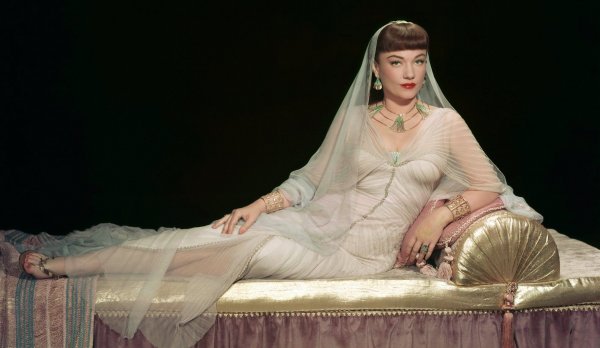- Messages
- 17,483
- Location
- New York City
The Ten Commandments from 1956 with a cast that includes almost every actor in Hollywood at the time
"His God, is God"
- Rameses
It's not often the theme of a three-plus-hour Biblical extravaganza can be summed up in four words, but leave it to a beaten Egyptian pharaoh to succinctly explain the defining meaning of the Moses story.
The Ten Commandments is an odd mix of Hollywood kitsch and Biblical tale that pings from silly to sublime, sometimes, from scene to scene. The bold Technicolor detracts from the solemnity of the subject (as a kid, I first saw it on a black-and-white TV, which is partly why it seemed more serious to me then). Still, when the narrative limns closely to the Bible, the cheesiness of the production fades as the power of the story takes over.
Having been raised without religion and only having read the Bible as an adult (in some updated English version), the movie seems to, generally, follow the Moses tale in the Old Testament, but I defer to anyone with even modest biblical knowledge.
Despite being a mashup of an overblown Hollywood production and Biblical story, and with a lot of 1950s movie-making excess on display, the film still engages throughout its runtime. Perhaps because it has impressive source material (although, Moses didn't get a writing credit) and a ton of story to get through, scenes just keep speeding by.
Sometimes it seems that the production almost overwhelmed famed director Cecil B. Demille, but he managed to somehow corral a cast of thousands, a rambling story with subplots all over the place and a crazy number of special effects to deliver an epic.
The core conflict - the battle of wills and theology between Rameses (Yul Brynner) and Moses (Charlton Heston) - frames the movie right down to the two powerful men wanting the same woman, Queen Nefretiri, played by Anne Baxter exuding an all-consuming lust, often, unrequitedly for Moses.
As Moses's path takes him from Pharaoh's son to a slave, his gradual evolution to prophet parallels Rameses rise to the throne as an Egyptian god on earth (but the god thing in Egypt is hard to keep track of as they had a lot of them back then).
Even though, here, the Egyptian palaces look a bit like modern-day over-priced luxury furniture "galleries'' (a lot of empty space between overwrought items), the power of the Egyptian Empire is impressive for its day (it's 1300 BC or thereabouts), making Moses' attempt to free his people more daunting.
But Rameses keeps losing out to God-made, Moses-prophesized miracle upon miracle. After derisively dismissing Moses' pronouncement that hail and darkness will come at noon, you see the confidence drain out of Rameses as hail begins to rain down, well, at noon.
When Moses warns Rameses that the first-born son of every Egyptian will be killed, and it happens, Rameses has had enough. In disgust, defeat and fear, he doesn't so much free the Israelis as gives up and lets them leave.
Nefretiri, angry because Moses has scorned her (heaven has no rage and all that), goads Rameses to change his mind when she all but tells him he has a small, umm, staff compared to Moses. So inspired, or shamed, Ramses leads the Egyptian army in pursuit of the fleeing Israelis.
When a wall of fire and a parting sea that, then, unparts and destroys Rameses army ends his pursuit effort, he returns to his palace a beaten man who has seen the power of the one God and utters the defining words, "His God, is God."
All that's left is, well, the really big Old Testament stuff. Moses ascends Mount Sinai where God writes the Ten Commandment in his own hand (it's a cool scene). Carrying the sacred tablets, Moses comes down to see, in the mere forty days he's been away, many of the Israelis have lost faith, are living wantonly and praying to a golden calf.
Let's pause here for a second. After God performed ten miracles to free the Israelis from Egypt and created a wall of fire while parting the sea to ensure their escape, they lost faith after forty days. Really? Seeing those events with my own eyes would have been enough to make me a believer for five lifetimes.
In disgust, Moses throws the Tablets with the Commandments at the offending calf, the Israelis wander in the desert for forty years and, finally, see the promised land as Moses is about to die. Whatever your faith, it's a powerful story that draws you in despite all the wacky 1950s movie-making silliness going on around the core Biblical tale.
N.B. Look for the scene where non-believer (in the Egyptian gods) Rameses, having just lost his young son, prays to the Egyptian god of darkness to bring his son back. It is a moving moment of a man now looking for faith, but who fails to find it in his own religion. Later, at the parting-of-the-sea event, he is convinced he has seen the one God, yet he can't acknowledge his new belief to his subjects. It's a powerful commentary on the eternal challenges of faith and identity.



